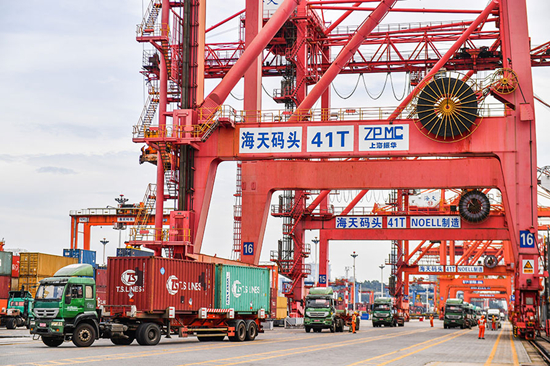China's free trade zones highlight sterling business environment

Freight containers being loaded onto trucks at the Haitian terminal, a terminal located in the Fujian free trade zone, on July 11. [Photo by Mai Tian / China Daily]
China has greenlighted the export of second-hand vehicles. As a result, nine cars were loaded onto a cargo ship in Nansha port in South China's Guangdong province last week, ready to sail to Cambodia. It took only three minutes for customs in Nansha to successfully clear the vehicles.
Xu Lanfang, a customs manager in Guangzhou A&D Customs Services Co Ltd which is the agency responsible for getting the clearance, said the nine cars gained their quality report on July 16, and the company immediately applied for the export permit and started the customs clearance process.
The very next day, July 17, the nine cars were bound for Cambodia.
The high efficiency of customs in Nansha port in the Guangdong Pilot Free Trade Zone represents only a fraction of the country's effort to optimize the business environment in the 12 free trade zones.
He Xiaorui, an official with the General Administration of Customs, said that since the free trade zones were set up, customs offices have introduced 52 measures that were avidly welcomed by companies.
"In the first half of 2019, 5,010 new companies from 12 free trade zones were registered with the customs, while the total number reached 85,045," said He.
"The total import and export volume (from the 12 free trade zones)has topped 1.61 trillion yuan ($234.16 billion), up 4.3 percent year-on-year, and accounts for 10.97 percent of the country's total foreign trade," the official added.
The Ministry of Commerce said the free trade zones have helped the country stimulate the market and have benefited the business environment in the whole nation.
By the end of 2018, the 11 free trade zones apart from Hainan have contributed to 12.25 percent of the country's foreign trade volume, said Yuan Yuan, deputy director of the department of foreign investment administration of the Ministry of Commerce.
"From January to June, the 12 free trade zones attracted 69.47 billion yuan in foreign investment, up 20.1 percent year-on-year, accounting for 14.5 percent of the nation's total," she said, adding the ranking of China's business environment in the world has climbed 50 places in the past six years since the free trade zones were set up.
Huo Jianguo, senior researcher of China Society for World Trade Organization Studies, said the development and expansion of the country's free trade zones has become a highlight of China's economy.
"The country will put more effort in the building of free trade zones," he said. "The free trade zone will stimulate investment and trade to safeguard the country's export-oriented economy."
All rights reserved. Presented by China Daily










